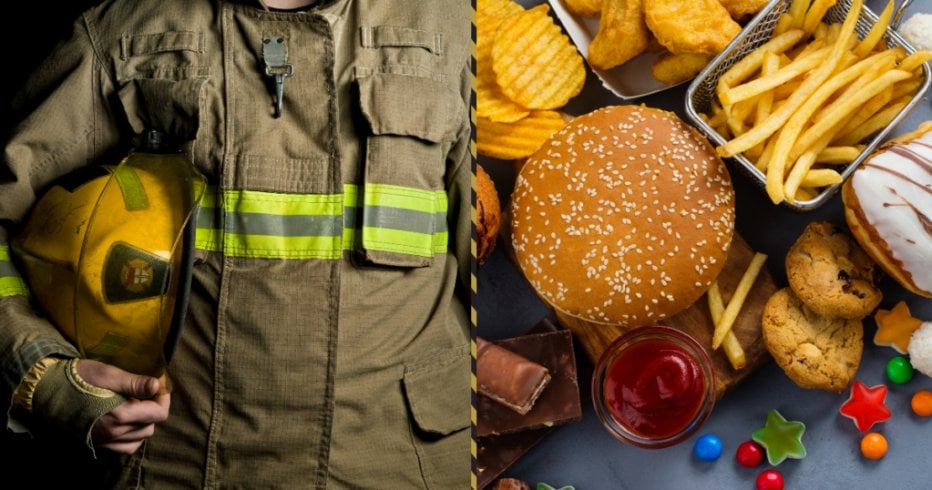Diet, Exercise And Obesity Through The Lens Of A Firefighter

By Matthew Bucala – Master of Public Health at the University of Michigan
A firefighter’s lifestyle is unique, as they spend many hours per week eating, sleeping, and responding to emergencies with their fellow firefighters. The work of a firefighter requires that they be in good physical shape, allowing them to function at a high level of physical performance for extended periods of time.
Maintaining a healthy weight and physical fitness level is also important to reducing health risks such as cardiovascular disease, diabetes, and certain forms of cancer that affect firefighters. However, staying in shape is challenging; in many of the busiest stations across the United States, responding to incidents can make eating proper meals and exercising difficult.
To uncover what aspects of the physical and cultural environment in the fire department might be impacting diet and exercise, we designed a research project that focused on what the members had to say. We conducted qualitative interviews with 17 firefighters within the a large fire department in the Northeast. Our questions focused on diet, exercise, obesity, and potential solutions to improve physical health within the department.
Results
Large portion sizes and unhealthy food options emerged as an issue that has impacted the department both in the past and present.
“Members have a lot more nutritional information than they did previously however, there are still members who are strict meat and potatoes eaters and will not change their diets. A lot of members use their shift at the firehouse as a cheat day because it is only two shifts per week. They feel as though they can splurge somewhat on the foods they would normally not eat at home. I’ve been in a lot of different firehouses and for the most part, the amount of food they serve for dinner could feed a soup kitchen. Generally, the fire service prepares for seconds.”
Raising awareness about proper nutrition and holding nutritional classes is one step the department has made to increase the health and well-being of the members. Having an open dialogue between leadership and the members regarding diet can help determine what solutions may work best for each department. Reminding new members of what the culture of food in the fire department used to be like is critical to avoid unhealthy habits.
Almost every participant noted that exercise is a vital aspect of staying healthy and is imperative to performing effectively as a firefighter. Most members said that the culture of exercise has improved within the department over the past five years, causing a positive change in overall health and well-being. Despite recent improvements in department fitness, participants raised several issues that cause them to avoid exercising at the fire station. For instance, a member explained, “I do not typically exercise at the station because I am afraid of an interruption during the workout. And depending on the shift that day, there may not be enough time if the companies get a couple fires the willingness to exercise will be lost!” Another member stated that “the problem is that each member has their own agendas for each shift that often do not include exercising.”
Taking a proactive approach in trying to increase every member’s ability to exercise more frequently will help build confidence amongst the members that the department is invested in their overall well-being. For example, members noted that this department has purchased exercise equipment to have in every station to make exercise readily available, and has discussed assigning a firefighter at each fire station to act as a fit liaison for the firehouse. Listening to what each member has to say regarding exercise is important to make sure new programs are successful.
Most members believed obesity had improved recently but remains an issue.
“ Obesity is due to a sedentary lifestyle and meal portions. Due to the fire department seeing less fires and labor-intensive work may be the cause of the excess weight gain among the members and it may also make it more difficult for the members to lose weight.”
For many departments raising awareness about obesity is an important step in ensuring all members have the tools they need to be healthy and ready for duty.
The department has implemented an exercise program that has benefited the department since its inception in 2016. The 16-week program increased the overall physical fitness for the members who participated. The strides the department has made are a great start, but more needs to be done to improve health and safety of the members. One potential solution would be an annual fitness assessment. We asked the members what they thought about a fitness assessment and they were generally in favor of this idea. One example comes from a member who stated:
“A regular fitness assessment would force people to be accountable for themselves. It would allow for the department to ensure that every member is functionally capable of performing the tasks of a firefighter. Being in an unfit state in the fire service can pose a risk to not only yourself but the other members of your group and the people you may need to save.”
Overall, this research highlights where the fire department was and is regarding diet and exercise, as told by the members. More research should be done with other departments to uncover the issues that impact the diet and exercise of firefighters so solutions can be devised that will work for departments nationwide.
Podcast
Contests & Promotions
















